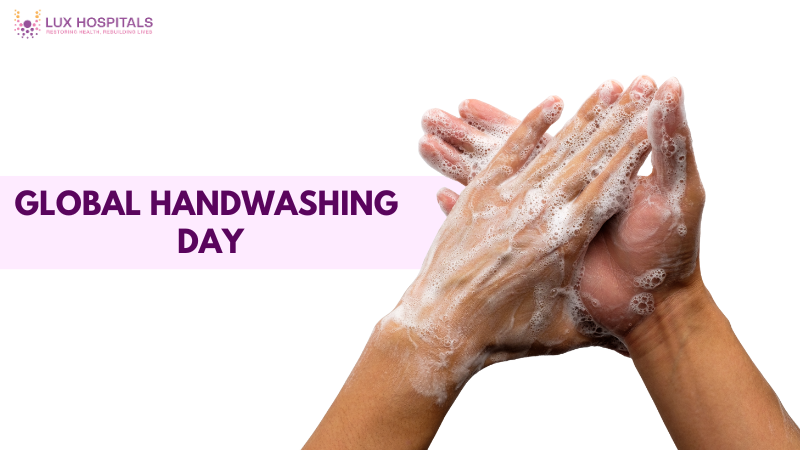Global Handwashing Day 2025: Clean Hands, Healthy Future

Every year, the world observes Global Handwashing Day on October 15. This campaign emphasises the importance of hand cleanliness in preserving health and preventing illnesses. The day is a global campaign that urges everyone to develop the lifelong habit of washing their hands with soap, not just a reminder. In 2025, Global Handwashing Day continues to inspire people, schools, and organisations worldwide to work together toward better hygiene practices and healthier communities.
The History of Global Handwashing Day
Global Handwashing Day was launched in 2008 by the Global Handwashing Partnership, with the support of various international health organisations, including UNICEF and WHO. The first celebration reached millions of children in over 70 countries, making it one of the most significant global hygiene movements. Since then, the observance has evolved into a global initiative promoting behavioural change and disseminating knowledge about how clean hands can save lives.
Theme of Global Handwashing Day 2025
Equal access to soap, clean water, and hygiene education is are key component of the 2025 Global Handwashing Day theme, “Clean Hands for All: Building a Culture of Hygiene.”
Key Aspects of the 2025 Theme:
- Promoting inclusive access to hygiene for everyone, including marginalised communities.
- Encouraging habit formation among children and adults.
- Building sustainable hygiene infrastructure in schools, workplaces, and healthcare centres.
- Strengthening community engagement through education and awareness.
This year’s Global Handwashing Day encourages global citizens to take personal and collective responsibility for hygiene practices that save lives.
Why Global Handwashing Day Matters
Because maintaining good hand hygiene is one of the easiest and most efficient ways to stop the spread of illness, Global Handwashing Day is important. However, millions of people around the world still do not have access to clean water and soap.
Key Benefits of Handwashing:
- Prevents illnesses like diarrhoea, flu, and respiratory infections.
- Reduces child mortality by up to 40%.
- Improves community health and reduces the burden on healthcare systems.
- Promotes school attendance, as children stay healthier and miss fewer school days.
By emphasising this through Global Handwashing Day, the world takes a unified step toward a healthier, safer, and more equitable future.
The Science Behind Handwashing
When we wash our hands with soap and water, the soap molecules bind with dirt, oil, and germs. The mechanical action of scrubbing for at least 20 seconds ensures harmful microbes are removed.
Five Simple Steps for Effective Handwashing:
- Wet hands with clean water.
- Apply soap and lather well.
- Scrub all parts of your hands—palms, back, between fingers, and under nails.
- Give it a good rinse under running water.
- Use an air dryer or a fresh towel to dry.
Encouraging people to follow these steps daily is one of Global Handwashing Day’s primary objectives.
When Should You Wash Your Hands?
Handwashing is essential at specific times throughout the day to stop the spread of germs.
Crucial Moments Include:
- Before and after eating or preparing food.
- After using the restroom.
- After coughing, sneezing, or blowing your nose.
- Before touching your face.
- After touching garbage, money, or shared surfaces.
- After caring for someone who is sick.
Celebrating Global Handwashing Day reminds us of these critical moments and encourages us to be mindful of hygiene.
Global Impact of Hand Hygiene
The WHO claims that better hand hygiene might avert millions of deaths each year. Handwashing is particularly important for preventing respiratory infections and diarrheal illnesses, which continue to be major health problems in underdeveloped nations.
The Impact Includes:
- Increased rates of child survival.
- Reduced healthcare costs due to fewer infections.
- Better productivity in schools and workplaces.
- Stronger pandemic preparedness, as seen during COVID-19.
Everyone is reminded that the cornerstone of global health security is hygiene through the observation of Global Handwashing Day.
Role of Workplaces and Governments
Workplaces:
- Encourage employees to maintain proper hygiene at work.
- Make handwashing stations easily accessible.
- Run internal efforts to raise awareness about hygiene.
Governments and NGOs:
- Initiatives related to WASH should receive funding.
- Collaborate with health organizations to encourage behavioral modification.
- Ensure that hygiene education is incorporated into public health policies.
Global Handwashing Day serves as a reminder that everyone—from individuals to institutions—has a role to play.
Conclusion
Global Handwashing Day 2025 is not just a day of awareness but a global movement toward building healthier societies. Clean hands are our first line of defence against infections and diseases. The world may become a safer and healthier place by encouraging frequent hand washing, making sure that everyone has access to soap and water, and improving hygiene education. To keep our family safe, let’s commit to making hand washing a daily routine.
Frequently Asked Questions
The primary objective of Global Handwashing Day is to encourage everyone to regularly wash their hands with soap and water and to increase knowledge of the value of good hand hygiene. It seeks to slow the spread of infectious illnesses around the world.
Global Handwashing Day was first celebrated on October 15, 2008, following its launch by the Global Handwashing Partnership. It has since become an annual global health event. An annual reminder that one modest effort can save millions of lives is provided by Global Handwashing Day.
Because it helps stop the transmission of bacteria, viruses, and illnesses, handwashing is essential. The World Health Organization (WHO) states that practicing proper hand hygiene can reduce diarrheal illnesses by up to 40% and respiratory infections by 23%. An annual reminder that one modest effort can save millions of lives is provided by Global Handwashing Day.
Handwashing helps prevent diarrheal diseases, respiratory infections, flu, and COVID-19. It also reduces the spread of many bacterial and viral infections that can easily be transmitted through contact.
Regular handwashing helps prevent diseases such as diarrhoea, flu, COVID-19, and other infections. It improves overall health, reduces healthcare costs, and protects communities from outbreaks.




















